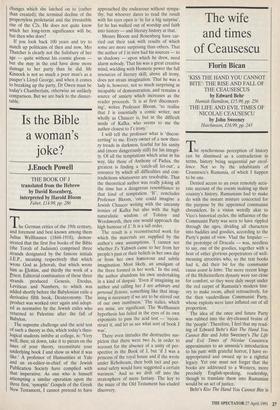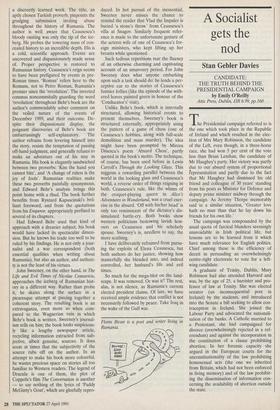The wife and times of Ceausescu
Florin Bican
The synchronous perception of history can be dismissed as a contradiction in terms, history being sequential par excel- lence. Not so by the inhabitants of Ceausescu's Rumania, of which I happen to be one.
Denied access to an even remotely accu- rate account of the events making up their country's history, Rumanians had to make do with the instant mixture concocted for the purpose by the appointed communist chroniclers. In a vision weirdly akin to Vico's historical cycles, the influence of the Communist Party was seen to have rippled through the ages, dividing all characters into baddies and goodies, according to the Party's point of view. Vlad the Impaler the prototype of Dracula — was, needless to say, one of the goodies, together with a host of other glorious perpetrators of well- meaning atrocities who, so the text books had it, did their bit for the communist cause avant la lettre. The more recent kings of the Hohenzollern dynasty were too close for comfort, so they were duly swept under the red carpet of Rumania's modern hist- ory to make room, albeit retroactively, for the then vaudevillean Communist Party, whose exploits were later inflated out of all proportion.
The idea of the once and future Party was rubbed into the dry-cleaned brains of the 'people'. Therefore, I feel that my read- ing of Edward Behr's Kiss The Hand You Cannot Bite and John Sweeney's The Life and Evil Times of Nicolae Ceausescu approximates to an amnesic's introduction to his past: with grateful horror, I have re- appropriated and owned up to a rightful legacy. Yet one must not forget that the books are addressed to a Western, more precisely English-speaking, readership, though to translate them into Rumanian would be an act of justice.
Behr's Kiss The Hand You Cannot Bite is a discreetly learned work. The title, an aptly chosen Turkish proverb, pinpoints the grudging submission inviting abuse throughout the history of Rumania. The author is well aware that Ceausescu's bloody ousting was only the tip of the ice- berg. He probes the towering mass of con- cealed history to an incredible depth. His is a cold, scientific approach. Events are uncovered and dispassionately made sense of. Proper perspective is restored to Rumanian history. Ceausescu's reign seems to have been prefigured by events in pre- Roman times. 'Roman' refers here to the Romans, not to Petro Roman, Rumania's premier since the 'revolution'. The inverted commas noncommitally guarding the word `revolution' throughout Behr's book are the author's commendably sober comment on the veiled nature of the events of December 1989, and their outcome. De- spite their dispassionate display, the poignant discoveries of Behr's book are embarrassingly self-explanatory. The author refrains from levering himself into the story, resists the temptation of passing off-hand judgment, and generally refuses to make an adventure out of his stay in Rumania. His book is elegantly sandwiched between two proverbs: 'Kiss the hand you cannot bite', and 'A change of rulers is the joy of fools'. Rumanian realities make these two proverbs painfully synonymous, and Edward Behr's analysis brings this point home with a thud. The book further benefits from Ryszard Kapuscinski's bril- liant foreword, and from the quotations from his Emperor, appropriately prefixed to several of its chapters.
Had Edward Behr used that kind of approach with a drearier subject, his book would have lacked its spectacular dimen- sion. But he knows his trade too well to be ruled by his findings. He is not only a jour- nalist and a war correspondent (both essential qualities when writing about Rumania), but also an author, and authori- ty is not the least of his virtues.
John Sweeney, on the other hand, in The Life and Evil Times of Nicolae Ceausescu, approaches the iceberg of Rumanian hist- ory in a different way. Rather than probe it, he skates along the surface in a picaresque attempt at piecing together a coherent story. The resulting book is an extravaganza, even more so when com- pared to the Wagnerian vein in which Behr's book is written. Sweeney's journal- ism tells on him; the book looks suspicious- ly like a lengthy newspaper article, recycling information extracted from sub- jective, albeit genuine, sources. It does seem at times that the subjectivity of the source rubs off on the author. In an attempt to make his book more colourful, he wastes precious space on stories all too familiar to Western readers. The legend of Dracula is one of them, the plot of Coppola's film The Conversation is another — to say nothing of the lyrics of 'Paddy McGinty's Goat', which are gleefully repro- duced. In hot pursuit of the inessential, Sweeney never misses the chance to remind the reader that Vlad the Impaler is buried 'a stone's throw' from Ceausescu's villa at Snagov. Similarly frequent refer- ence is made to the unfortunate gesture of the actress wife of one of Ceausescu's for- eign ministers, who kept lifting up her breasts while questioned.
Such tedious repetitions mar the fluency of an otherwise charming and captivating account of an unsavoury period. For John Sweeney does what anyone embarking upon such a task should do: he lends a per- ceptive ear to the stories of Ceausescu's funnier follies (like the episode of the with- ered leaves painted green in honour of the `Conducator's' visit).
Unlike Behr's book, which is internally structured, allowing historical events to present themselves, Sweeney's book is structured externally, appropriately using the pattern of a game of chess (one of Ceausescu's hobbies, along with full-scale demolition and mass murder). The idea might have been prompted by Mircea Dinescu's poem 'Absurd Chess', partly quoted in the book's motto. The technique, of course, has been used before in Lewis Carroll's Through the Looking Glass. This suggests a rewarding parallel between the world in the looking glass and Ceausescu's world, a reverse order of things reigning in both. Ceausescu's rule, like the whims of the croquet-playing queen in Alice's Adventures in Wonderland, was a cruel exer- cise in the absurd. 'Off with his/her head' is only too reminiscent of the dictator's dis- simulated battle-cry. Both books show western politicians bestowing lavish hon- ours on Ceausescu and his scholarly spouse. Sweeney's is, needless to say, the more scathing.
I have deliberately refrained from pursu- ing the exploits of Elena Ceausescu, but both authors do her justice, showing how masterfully she blended into, and indeed controlled, her husband's life and evil times.
So much for the mega-blot on the land- scape. It was removed. Or was it? The rest, alas, is not silence, as Rumania's current elected president claims. Of late, we have received ample evidence that conflict is not necessarily followed by peace. Take Iraq in the wake of the Gulf war.
Florin Bican is a poet and writer living in Rumania.



















































 Previous page
Previous page